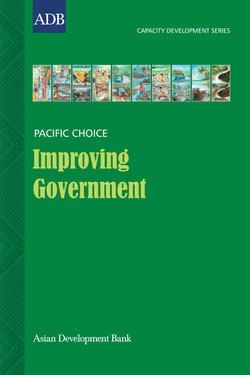Читать книгу Improving Government - Michael Heppell - Страница 4
FOREWORD
ОглавлениеDespite 50 years of aid in the Pacific region, including some $20 billion of support over the past 25 years, overall results in terms of sustainable improvements in capacity have been mixed, at best. This raises questions, not only in the Pacific but throughout the developing world, about approaches to building capacity—what works, what doesn’t, and why? The Asian Development Bank (ADB) recognizes the importance of capacity development, having officially embraced it as a thematic priority in 2004. ADB’s commitment is consistent with the Paris Declaration on Aid Effectiveness and the Pacific Principles on Aid Effectiveness. The programs of a number of other funding agencies, including the Australian Agency for International Development (AusAID), New Zealand Agency for International Development (NZAID), United Nations Development Programme (UNDP), and the World Bank also embrace the importance of more effective capacity development.
Increased interest in capacity development in recent years reflects an acknowledgment of the shortcomings in development assistance over the past 50 years. This has led to calls for approaches that are more systematic and integrated, and which focus more on developing country ownership and achievement of sustainable results. Capacity amounts to the policy, procedures, personnel, institutions, and supporting environment required to effectively deliver development outcomes. In particular, ADB has focused on the ability of the public sector to deliver essential public services, thereby strengthening the compact between government, civil society, and the private sector. Capacity development is much more than just training or skills transfer. It is about effective institutions, a sound unpoliticized policy environment, accountability systems, effective relationships, and appropriate incentives. As noted in this study, capacity development should be firmly rooted in a country’s political economy.
To better understand what works, in terms of approaches to capacity development, with significant cofinancing from AusAID, ADB’s Pacific Department (PARD) commissioned a regional study in 2006. The study led to a report which “explores the capacity needs and prerequisites for capacity development in the context of the independence of various levels of government.” Further work was then commissioned to build on study findings. This has led to the formulation of a framework to “examine capacity development opportunities within the organization of government business and pinpoint conditions that increase the likelihood of [better government].” ADB’s intent in commissioning this report Pacific Choice: Improving Government was to draw upon the study’s findings and recommendations to help guide future capacity building efforts in the Pacific, including institutionalizing a more focused and effective approach to capacity development in country programs and operations.
This report was prepared by Michael Heppell, under the direction of Steve Pollard, principal economist, PARD. The report has also benefited from the comments and inputs of a number of resource persons. I trust that you will find the report both thought provoking and practically helpful in advancing our collective commitment to development in the Pacific.
Sultan Hafeez Rahman
Director General
Pacific Department
